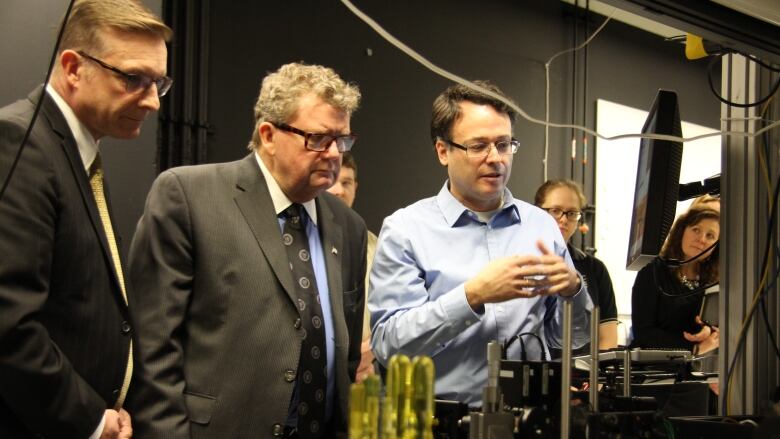What is quantum computing and why should you care?
Director of Quantum Computing Institute in Waterloo explains the high-tech science

Elected officials gathered at the University of Waterloo Thursday to celebrate the federal government's $15 million investment in the university's Institute for Quantum Computing.
Although the money has been allocated since the release of federal budget last year, Kitchener-Waterloo MP Peter Braid and London MP Ed Holder took advantage of the opportunity to tout the government's investments in innovation in advance of an upcoming federal election later this year.
Still, the money is a welcome addition to the high-tech institute, currently racing other facilities around the world to be the first to develop a quantum computer.
CBC spoke with the Institute of Quantum Computing's executive director RaymondLaflamme, to find outexactly what is being done at the university, and what it could meanfor daily life.This interview has be edited and condensed.
CBC: What is quantum computing?
RL: It is computing with the laws of quantum physics.That means using the science that describes the world of atoms and molecules to create high powered computing technology.
CBC: What are the practical applications of quantum computing?
RL: The first application is computing more efficiently and faster. It also leads to other types of technologies, like quantum cryptographynew ways of encrypting information and ensuring it is private, so people cant eavesdrop. A third piece of the technology is sensors that are a lot more sensitive to things around us. Quantum sensors will be able to sense things that sensors today cant, whether that is a sensor in your thermostat, in your car to regulate airflow or on airplanes to know what speed it is moving at.
CBC: What is the main goal for the Institute of Quantum Computing?
RL: The institutes long-term goal is building this quantum computer. But on the way there we learn how to manipulate, control and direct atoms and molecules and make them do things we want them to do. Computing is one long-term application but on the way there we can think about new types of sensors which can sense things at the size of atoms and molecules, use it and feedback to certain applications that could be medical or exploration of natural resources.
CBC: What is the most common misconception about quantum computing?
RL: People think its going to happen 30 or 50 years from now, but its going to happen much faster than this. The quantum revolution is happening now. Its not something of the future.
CBC: Youve joked about building a quantum teleporter and a time machine. Is the science fiction of quantum computing become a reality now?
RL: The author Arthur C. Clarke said, 'Any sufficiently advanced technology looks like magic,'and I would say thatquantum science isof that type.












_(720p).jpg)


 OFFICIAL HD MUSIC VIDEO.jpg)
.jpg)



























































































